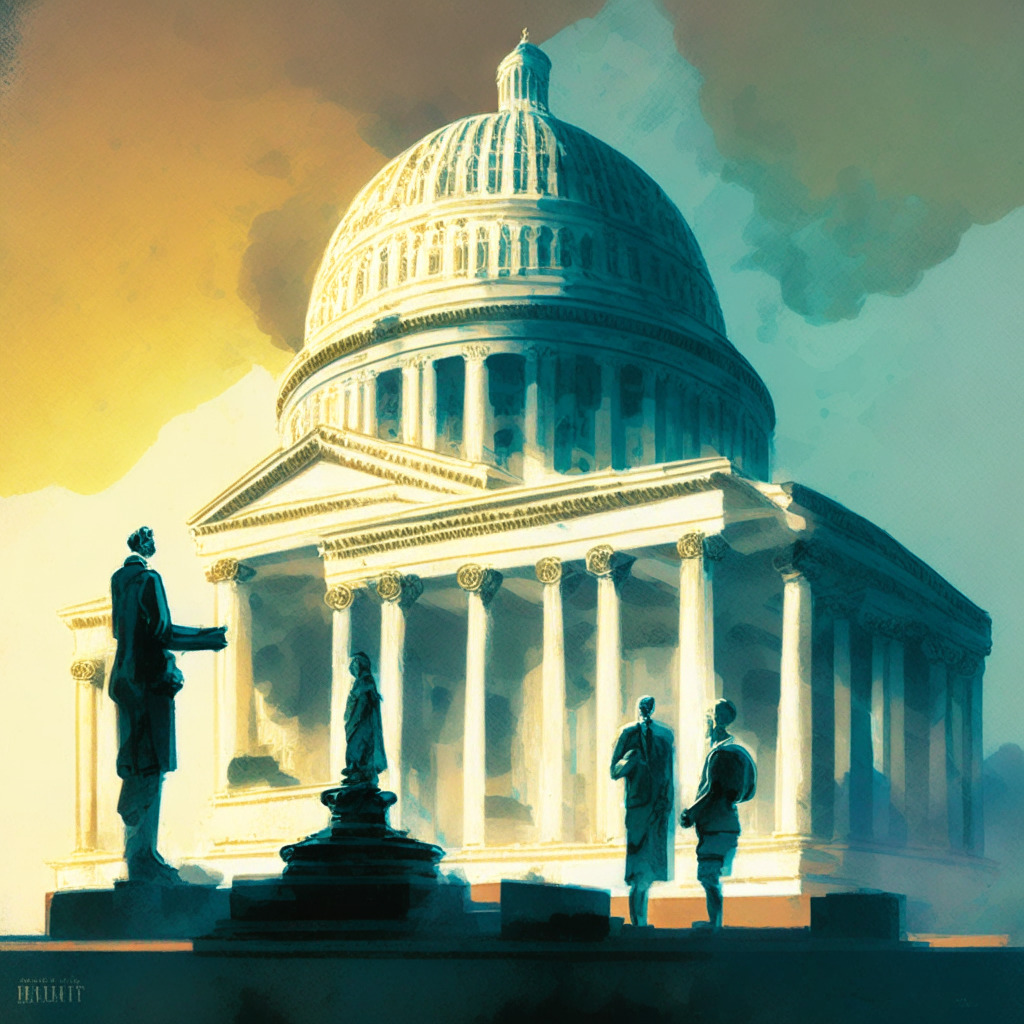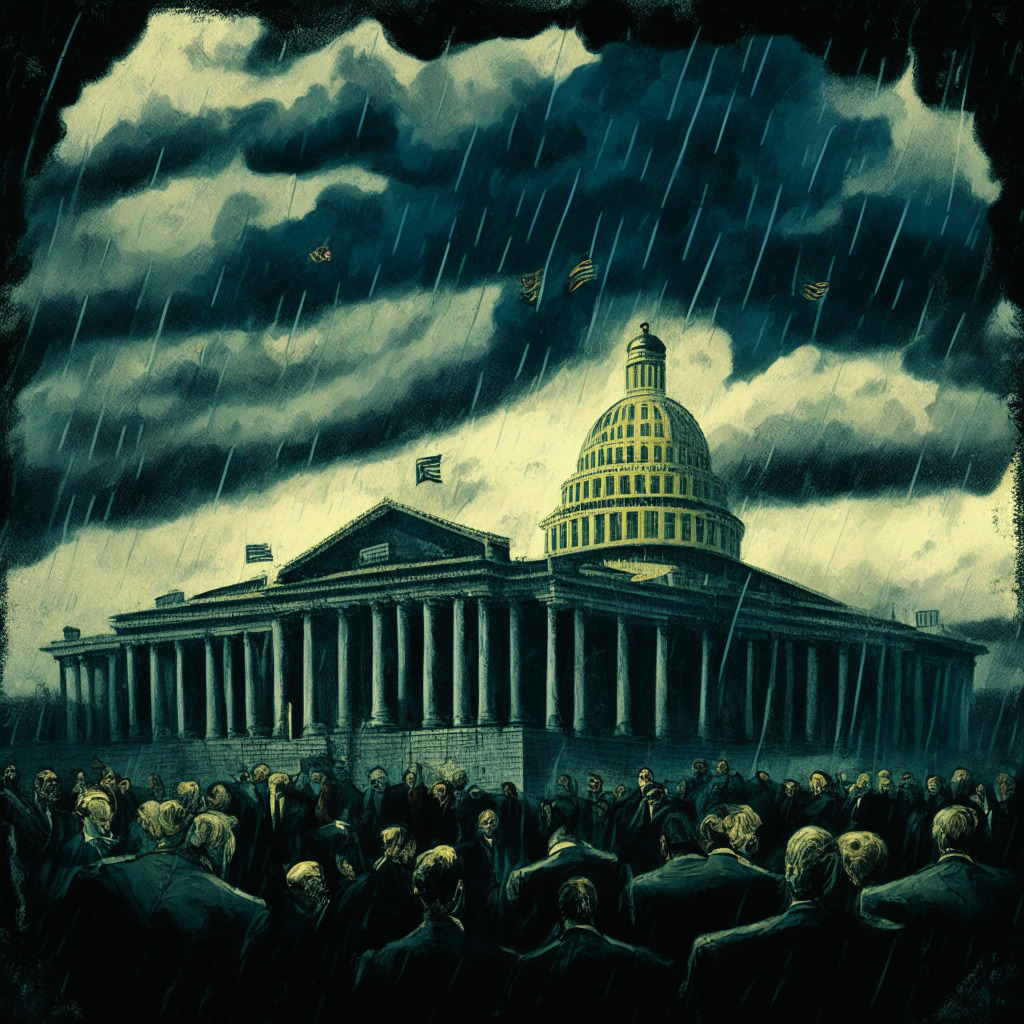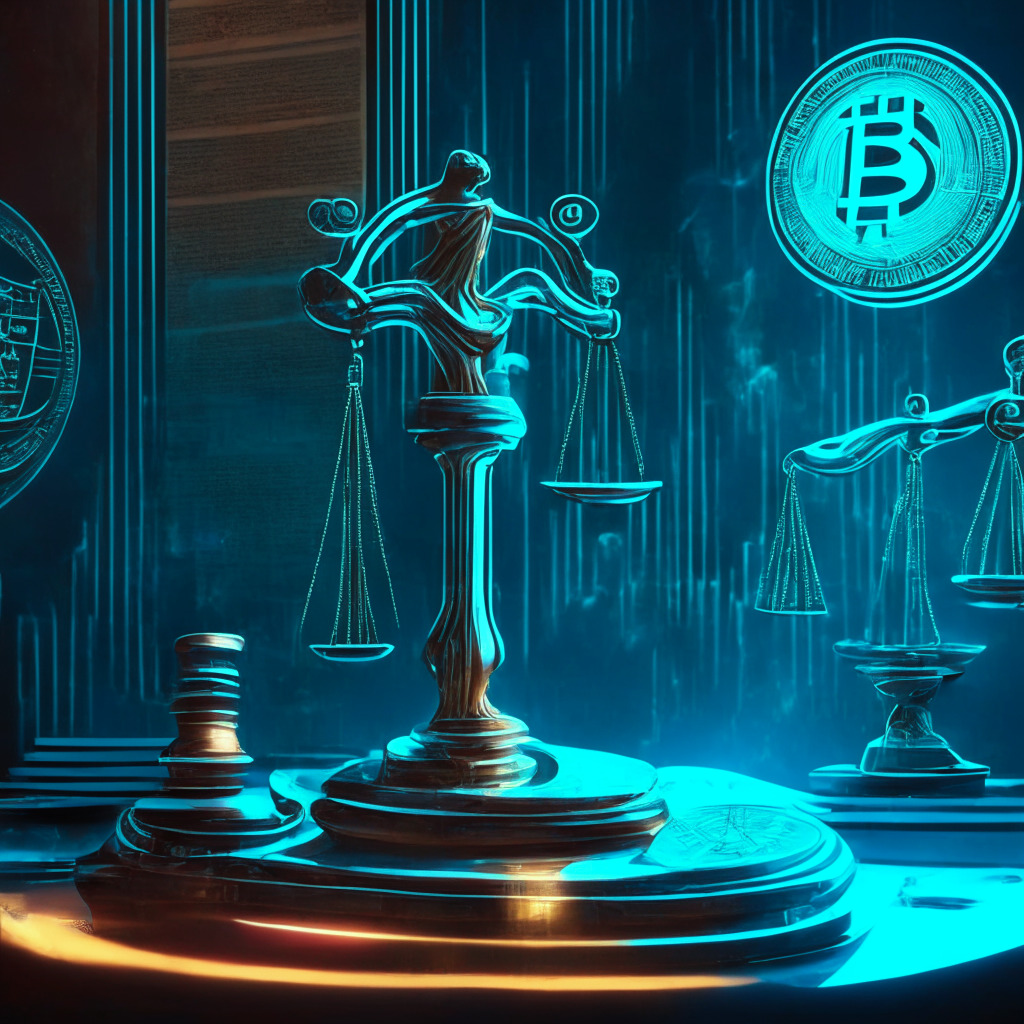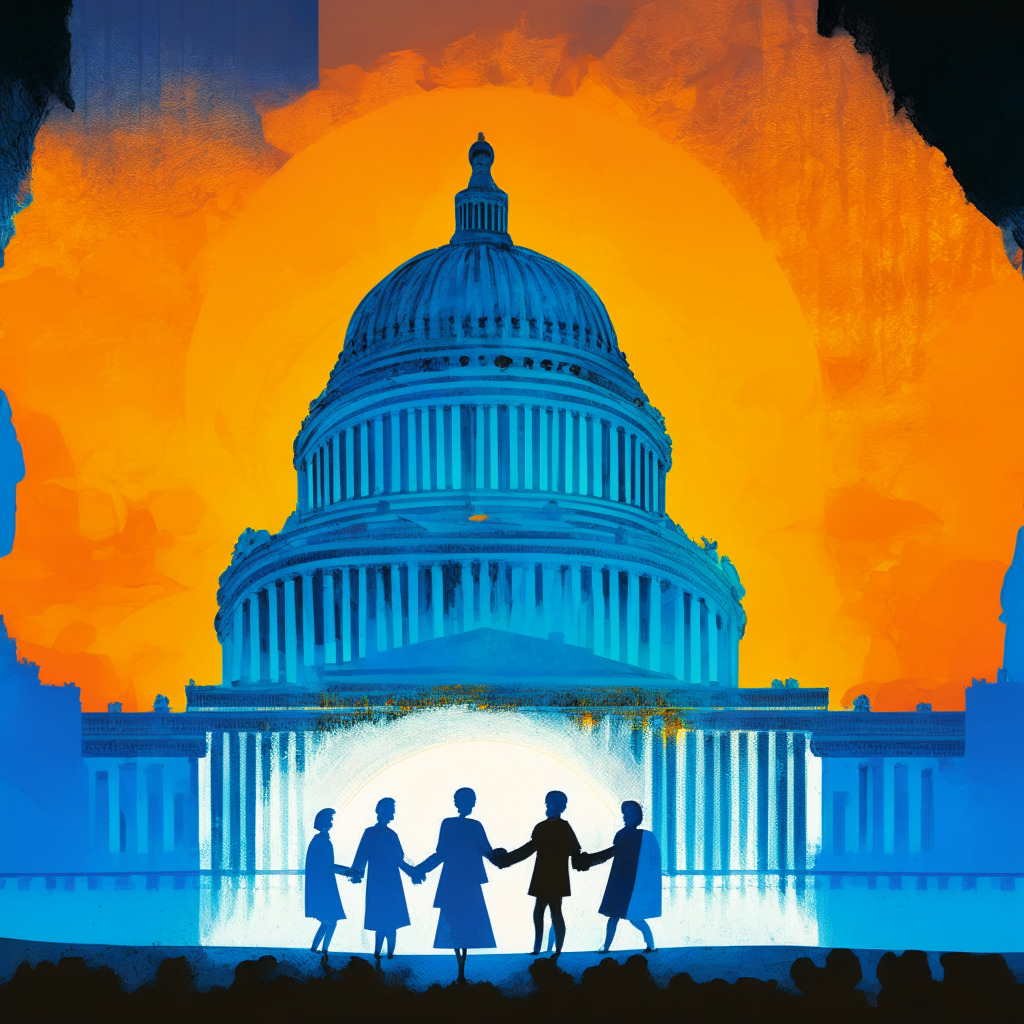“US representatives French Hill and Dusty Johnson question SEC chairman Gary Gensler’s approach to digital asset regulation. They suggest that shaping legislation is a more potent tool for resolving regulatory issues in the digital asset space, offering firms guidance and bolstering customer protection.”
Search Results for: French Hill
Battleground CBDC: A Bipartisan Struggle Shaping Cryptocurrency’s Future in the U.S.
The House Financial Services Committee introduced three bills halting the Federal Reserve’s considerations towards a Central Bank Digital Currency (CBDC). Republicans expressed fears over the potential impact on traditional banking and the suspense it could cast on the stablecoin market. Democrats, however, pushed for continued CBDC exploration, reminding of its potential benefits in global economic competition. The Federal Reserve reaffirmed its cautious approach towards CBDC, emphasizing concerns over a stablecoin issuance without federal control.
CBDC Anti-Surveillance State Act: Preserving Financial Privacy in the Age of Digital Currencies
U.S. Representative Tom Emmer, with the support of 49 other Republican representatives, reintroduced the CBDC Anti-Surveillance State Act to prevent unjust financial surveillance through retail central bank digital currencies (CBDCs). Advocates contend such government-sanctioned currency must respect financial privacy, individual freedom, and market competitiveness.
Navigating Crypto Regulations: The CBDC Anti-Surveillance State Act and the Privacy Debate
“Regulation of cryptocurrencies and the blockchain technology is a pressing topic, with concerns about privacy and government surveillance. The ‘CBDC Anti-Surveillance State Act’, reintroduced by Rep. Tom Emmer, aims to limit unelected authorities in issuing a central bank digital currency (CBDC), fearing it could be used as surveillance resources.”
Federal Reserve’s Tightened Grip on Crypto Sparks Republican Lawmakers’ Concerns
Republican lawmakers express concerns over the Federal Reserve’s intensified oversight on crypto and stablecoin activities, arguing it might block the progress of a legislative proposal aimed at regulating stablecoins. Lawmakers believe the increased scrutiny might dissuade financial institutions from entering the digital asset ecosystem.
Crypto Regulatory Tug-of-War: An Analysis of Recent Developments & Legislative Initiatives
Senator Jack Reed introduced a bill to strengthen Know Your Customer and Anti-Money Laundering regulations within decentralized finance. Meanwhile, two House committees proposed a bill to clarify regulatory authorities’ jurisdiction over digital commodities. Despite opposition, these developments highlight the need for clearer DeFi regulations and could shape its future trajectory.
Sweeping Legislations and the Future of Crypto: Balancing Innovation, Regulation, and Decentralization
“The upcoming legislations aim to provide regulatory clarity for cryptocurrencies, blockchain, and stablecoins. This could streamline integration of blockchain into traditional business models while assuring investor protection. However, this might challenge the decentralization aspect that cryptocurrencies stand for, leading to an uncertain blockchain future.”
Assessing the Impact of Newly Proposed US Blockchain Regulation Bill
Senior House Republicans proposed a bill called the “Financial Innovation and Technology for the 21st Century Act.” The legislation aims to define “blockchain” and “digital asset” in financial laws, clarify the roles of the CFTC and SEC in cryptocurrency oversight, and establish clear guidelines for classifying digital assets. Despite some opposition, it has substantial backing due to its dual objective of consumer protection and promoting innovation.
Navigating Regulatory Rifts: US Congressional Discourse on the SEC’s Approach to Crypto Regulation
“Bitcoin and blockchain technology’s global influence faces regulatory scrutiny. Skepticism towards the US Securities Exchange Commission’s approach to cryptocurrency regulation is voiced by senior Republican members. Accusations of targeting crypto for publicity rather than comprehensive legislation prompt concerns about customer protection and compliance.”
Bipartisan Agreement on Stablecoin Regulations: A Hopeful Step or Potential Roadblock?
The Republicans and Democrats have found consensus on proposed stablecoin regulations, with the Financial Services Committee targeting state-wise legislations. The bill tasks the US Federal Reserve with enforcing regulations and could give the Commodity Futures Trading Commission more oversight over cryptocurrencies. The state vs federal regulation issue may present future challenges.
SEC’s Controversial Rule Sparks Debate: Impact on Digital Asset Industry and Struggle for Balance
A group of Republican lawmakers criticized a proposed SEC rule, arguing it could shut down the digital asset industry’s development. They expressed concerns that the rule, potentially expanding the definition of an exchange, would capture various individuals, including software developers and blockchain network participants. The controversy highlights the growing consensus on the necessity of a clear legal framework within the cryptocurrency space.
Navigating the Turbulent Waters of Crypto Regulation: Challenges and Prospects
Congress’ latest proposed crypto bill seeks to resolve the “haphazard, schizophrenic” ways of regulators addressing significant industry players. The bill faces challenges in securing passage and has received mixed reactions from policymakers. However, the bipartisan nature of the issue provides hope for progress in clarifying regulatory expectations.
SEC Lawsuits, FTX Bankruptcy, and BitGo Acquisition: Market Impact on Bitcoin and Ethereum
Bitcoin and Ethereum face significant developments impacting price predictions due to the US SEC lawsuit, bankruptcy of FTX exchange, and BitGo’s acquisition deal. As clear regulation and reliable custody services are crucial, cryptocurrency prices remain sensitive to market changes.
SEC Enforcement Actions Surge Post-FTX Collapse: Striking the Balance between Regulation and Innovation
The SEC’s cryptocurrency-related enforcement actions increased by an estimated 183% following the bankruptcy of crypto exchange FTX. This surge reignited debates on balancing regulation and innovation, as concerns arise about stifling growth and driving companies away from the US market.
Bank of Japan’s CBDC Pilot: Global Trends and Privacy Concerns Clash
The Bank of Japan’s CBDC initiative report reveals 11 countries have introduced a central bank digital currency, while 18 others are in the pilot stages. Amid growing global interest, concerns about privacy and regulatory challenges persist as nations explore CBDCs’ potential in the future of finance.
Bipartisan Battle Against CBDCs: Financial Privacy vs Global Adoption in 2023
US lawmakers introduced a bipartisan bill aimed at preventing the Federal Reserve from issuing a central bank digital currency (CBDC), citing concerns over financial privacy and surveillance. Despite opposition, global interest in CBDCs remains strong, with various countries planning pilot testing in 2023.
Stablecoin Lobbying Efforts Heat Up: The Battle for Regulatory Clarity and Supremacy
Tether and Circle spent $1.15 million lobbying U.S. lawmakers on stablecoin regulations, highlighting the emerging crypto industry’s significance. Competing draft bills permit banks and non-banks to issue stablecoins, but differences remain on the regulatory framework, affecting stablecoin development and adoption.
Bipartisan Efforts to Regulate Stablecoins: Finding Common Ground in Crypto Legislation
Two distinct stablecoin bills from US House Financial Services Committee reflect differing perspectives among Democrats and Republicans. Despite differences, lawmakers aim to reach a bipartisan agreement for effective regulation of the burgeoning stablecoin market while protecting consumers and investors.
Stablecoin Regulation Debate: US Lawmakers’ Divide and the Future of Digital Dollar
The US House Financial Services Committee’s digital assets panel debated on stablecoin regulations, highlighting divides between Republican and Democratic ideas. Both parties do align in addressing risks to consumers and maintaining the US dollar’s role in global commerce. Lawmakers are paying heightened attention to stablecoin regulations and wider crypto topics, marking progress in US oversight of the industry.
US
A joint hearing on digital asset regulation between the House Financial Services Committee and Agriculture Committee revealed conflicts between lawmakers on handling cryptocurrencies. Witnesses advocated for legal amendments addressing blockchain technology, while some lawmakers deemed existing regulations sufficient. The stalemate complicates predicting major legislative changes or digital asset firms enjoying freedom from regulation.
Navigating the Rough Waters: Binance’s Battle with Global Regulatory Unrest
“Binance, a global cryptocurrency exchange, currently faces global regulatory scrutiny that has pushed the company on the defensive. From Australian officials’ direct inquiries, U.S and French regulator charges, to the rejection from the Dutch, indicate a growing regulatory dissatisfaction globally.”
Binance Exodus & Legal Battles: Examining Crypto Exchange Under Fire
“Amid a tightening regulatory environment, key figures from Binance have stepped down, escalating concerns over the crypto exchange’s compliance. Accusations against Binance include deceptive practices, money laundering, and sanctions violations, with lawsuits already in motion. These challenges underscore the importance of robust regulatory compliance in the crypto industry.”





















